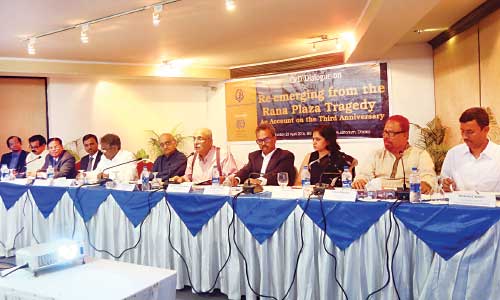CPD study on Rana Plaza: RMG workplaces improve, but at a slow pace
Centre for Policy Dialogue on Saturday said some improvement has been made in the working environment of Bangladesh’s readymade garment sector after the Rana Plaza collapse, but the progress is slow.
CPD said the government should take a coordinated and institutionalised approach to increase the pace of this process of improvement so that the country can avoid incidents like Rana Plaza.
In the report of a study on ‘post-Rana Plaza development in Bangladesh: towards building a responsible supply chain in the apparels sector,’ the independent policy think-tank said the major challenge for developing a responsible supply chain in the RMG sector is the slow preparation of the market players and stakeholders.
CPD released the report at a dialogue on ‘Re-emerging from the Rana Plaza Tragedy: An Account on the Third Anniversary’ at BRAC Centre Inn in the city.
CPD said the issues of missing workers, treatment, re-employment, and compensation are still dogging the Rana Plaza victims even three years into the world’s worst industrial disaster in the RMG sector that took place on April 24, 2013.
CPD distinguished fellow Debapriya Bhattacharya moderated the dialogue chaired by economist Rehman Sobhan.
CPD additional research director Khondaker Golam Moazzem presented the study report in the session.
The study found that the number of missing workers in Rana Plaza collapse has declined in the last three years, but 55 of them remain still missing, although the government claims the number is 10.
‘Families did not get support due to lack of proper identification of their missing members,’ the report said.
The study found health risks are still a major concern among the survivors in pursuing a normal life, while a good number of them are suffering from psychological disorders and so are unable to carry out normal economic activities.
Debapriya said it is regrettable that the people responsible for the Rana Plaza collapse have not been punished in the last three years.
He said the issues of missing workers, compensation, reemployment, and treatment of survivors should be addressed immediately.
‘We are satisfied with the progress in some issues, but there are many unfinished agenda,’ Debapriya said.
The CPD study found that immediately after the Rana Plaza collapse, the number of trade union registrations in the readymade garment sector had seen an increase, but the process slowed down drastically, by 72 per cent, in 2015.
As of March 2016, only 10 trade unions have been registered, the report said.
The report observed that the requirement of representation of 30 per cent of the total workers was one of the major problems for trade union registration.
CPD suggested changing the mindset of the stakeholders to contextualise the ongoing initiative beyond the Rana Plaza issues and to establish a strong linkage between decent working environment and further improving competitiveness of the apparel sector.
It also suggested institutionalising the financial support system for the injured workers in the industrial sector and institutionalisation of the inspection and monitoring process.
Rehman Sobhan said institutional arrangements and policies are needed so that incidents like Rana Plaza don’t recur.
The study report expressed concern at the slow pace of factory remediation, saying that a large number of safety problems at the factory buildings remain unaddressed.
Following the Rana Plaza tragedy, initiatives by western buyers and the national initiative have so far inspected 3,632 factories, but more than 900 RMG factories making products for the local market have remained out of the assessment process.
Labour secretary Mikail Shipar said the government has taken a number of initiatives to ensure workplace safety, but challenges are there.
He mentioned shared and rented factory buildings, insufficient technical assistance, lack of continuous monitoring of remediation process, and lack of financing as the challenges in factory remediation.
Srinivas B Reddy, country director of International Labour Organisation, said the factory owners should feel the urgency to carry out the remediation work.
He said the safety inspection of the factories that are not members of the BGMEA or the BKMEA but who manufacture products for the domestic market is also important.
US ambassador Marcia Bernicat said factory remediation will be good for the productivity of the workers.
She urged the government to ensure transparency in trade union registration and to address unfair labour practices.
Bernicat said the US would remain engaged with Bangladesh to ensure occupational safety and good health of workers.
Bangladesh Legal Aid and Services Trust executive director Sara Hossain urged the government to make legal amendments to set the amount of compensation for a worker who dies or is injured in an occupational accident at a reasonable level.
Sramik-Karmachari Oikya Parishad leader Wajed-ul Islam Khan demanded that the Rana Plaza victims should be compensated as per the ILO Convention 121 and that those responsible for the Rana Plaza disaster be punished.
News Courtesy: www.newagebd.net











